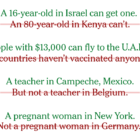Español
Nuestra selección de historias de investigación de América Latina – 2020
|
Los periodistas en Latinoamérica tienen mucho que enseñarnos. En la búsqueda por la verdad, a veces se enfrentan a amenazas de los gobiernos, organizaciones criminales y empresas multinacionales debido a sus historias. Sin embargo, estos reporteros y editores hacen que el periodismo de calidad en la región siga creciendo, y producen investigaciones que responsabilizan a quienes están en el poder.




